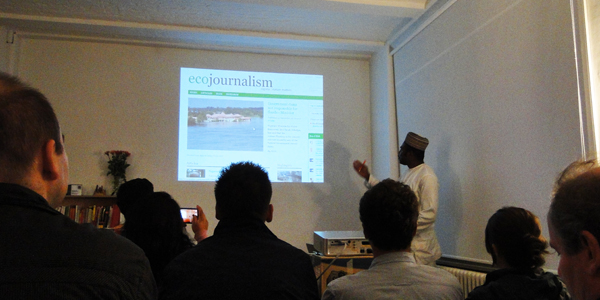Three is the magic number for Hacks/Hackers Berlin

Berlin's vibrant start-up scene is, by now, well-documented. What's not clear is whether we're reaching a critical mass of young, web-centric companies whose legacy will endure, or whether this is a bubble waiting to burst.
Regardless, Berlin's enthusiasm for innovation, social media and open source is infectious, and the third incarnation of Hacks/Hackers in Berlin saw attendance from all sectors of journalism - traditional and digital - as well as technologists, coders, designers and an entire Sourcefabric team coming to the end of Sourcecamp, their annual meet-up.
So, what did we learn?
Use more audio
Ben Fawkes at Hacks/Hackers Berlin | Photo credit Kristin Trethewey
That's what Ben Fawkes of SoundCloud wants us to do at least, and why not? The Berlin music start-up (well and truly started up by now) have added considerably to the roster of SoundCloud-using professional news organisations since last year and count ABC, France 24 and Aljazeera amongst their community now. Much of this is because of the new HTML5 interface, which new organisations find easier to brand and customise, but increasingly we'll see SoundCloud's mobile app become a tool for serious journalists with additions to its functionality no doubt on the way.
Twitter's impacting global politics
Journalism++ at Hacks/Hackers Berlin | Photo credit Kristin Trethewey
With the E-Diplomacy project, initiated by Agence France-Presse and implemented by Journalism++, intrepid web-browsers can take a look at several visualizations and mappings of the relationships between Europe's various diplomats and embassies. Using Twitter relations as the core data-set, E-Diplomacy allows anyone to view the matrices of influence that are perhaps shaping Europe's political landscape.
Consider the environment
Award-winning Nigerian journalist Michael Ilesanmi explained to the gathering why environmental reporting isn't all about global warming and oil spills. Rather, he says, it's a frame through which larger social, political and cultural happenings can be understood. This, claims Michael, is especially true of Nigeria where a vast percentage of the country's wealth comes from its natural resources. It was also the motivation for ecojournalism.org, a news portal powered by Sourcefabric's own Newscoop 4.
Datajournalism doesn't exist
Lucy Chambers at Hacks/Hackers Berlin | Photo credit Kristin Trethewey
It's just journalism, says Lucy Chambers, Community Co-ordinator at Open Knowledge Foundation. Ironically, she's one of the folks behind the Data Journalism Handbook (a title soon to be followed by the Open Spending Handbook it is hoped). Written last year at the Mozilla Festival, this has now been translated and contains all sorts of information on the whats, whys and hows of data-driven reporting.
Open source states are coming
Stephen Kovats at Hacks/Hackers Berlin | Photo credit Kristin Trethewey
The #OSJUBA project launched earlier this year in Berlin, bringing together various Sudanese political figures alongside NGOs, German development agencies and an engaged activist scene to look at open source methodologies in the context of South Sudan. Can the world's newest capital Juba really be built with open source governance and infrastructure at its core? Stephen Kovats, founder of r0g_media and initiator of the project, thinks so.
Voices will be heard
Irrepressible Voices at Hacks/Hackers Berlin | Photo credit Kristin Trethewe
Irrepressible Voices gave a good account of their new project, which has the simple but lofty premise of giving voices to the voiceless through a network of journalists, citizen activists, NGOs and media partners. Still in its alpha phase, it's founders are using Berlin's start-up scene as a great platform to garner early support and build momentum.
The biggest Hacks/Hackers yet finished with networking and conversations into the small hours, which is where, let's be honest, the real work is done. Next time we'll hit the road and hold our meeting in Zeit Online's new digital newsroom, the perfect place to further examine how Berlin is 'rebooting journalism.'
